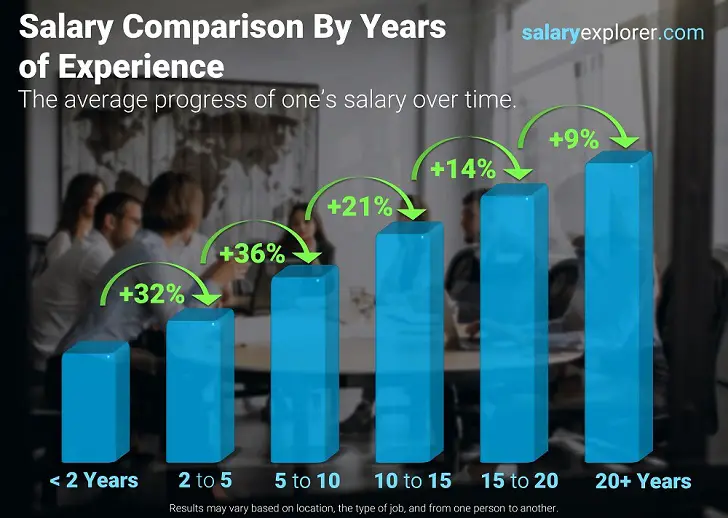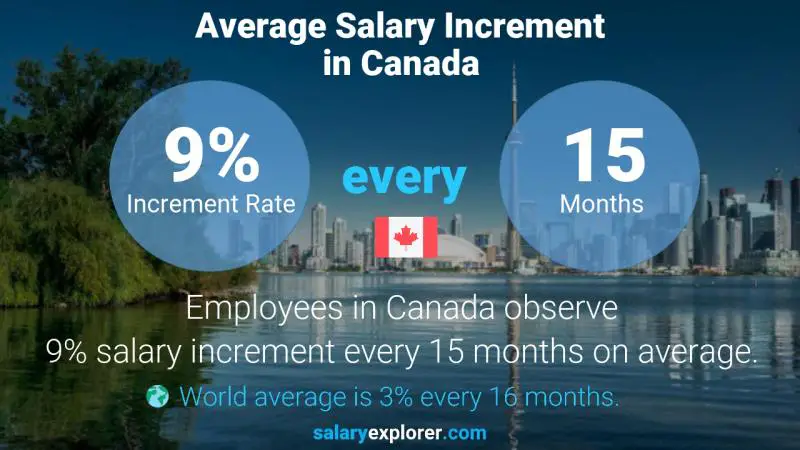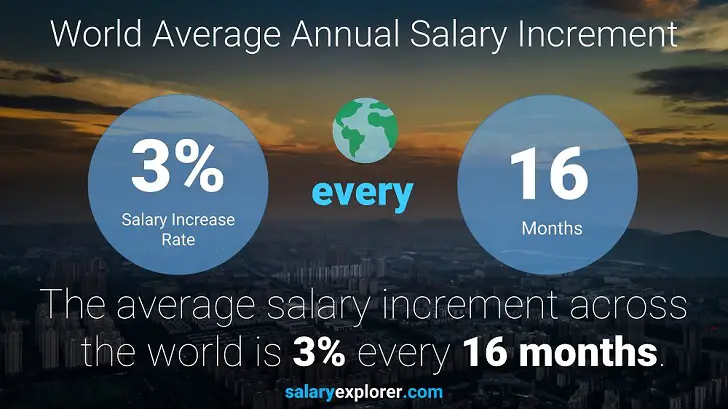Process Engineer Average Salary in Canada 2024
How much money does a person working as Process Engineer make in Canada?

LOW
55,200
CAD AVERAGE
104,000
CAD HIGH
158,000
CAD
A person working as Process Engineer in Canada typically earns around 104,000 CAD. Salaries range from 55,200 CAD (lowest) to 158,000 CAD (highest).
Salary Variance
This is the average salary including housing, transport, and other benefits. Process Engineer salaries in Canada vary drastically based on experience, skills, gender, or location. Below you will find a detailed breakdown based on many different criteria.
Process Engineer Pay Scale and Salaries in Canada

Salary Structure and Pay Scale Comparison
93,600 CAD or more
83,600 to 93,600 CAD
61,600 CAD or less
61,600 to 83,600 CAD
 55,200 CAD |
 94,000 CAD |
 158,000 CAD |
Median Salary, maximum and minimum salary, minimum wage, starting salary, and the salary range
Salary Range, Minimum Wage, and Starting Salary
Salaries for the position Process Engineer in Canada range from 55,200 CAD (starting salary) to 158,000 CAD (maximum salary). It should be noted that the given figure is not the legally mandated minimum wage; rather, it represents the lowest figure reported in a salary survey that included thousands of participants and professionals from all regions of the country.
Median Salary
With a median salary of 94,000 CAD, half of the professionals who work as Process Engineer in Canada earn less than this amount, and the other half earn more. The median salary denotes the middle value of salaries. Ideally, you would want to belong to the group earning more than the median salary, located on the right side of the salary distribution graph.
Percentiles and Salary Scale
The median is closely associated with two other values known as the 25th and 75th percentiles. By examining the salary distribution chart, it can be determined that 25% of professionals employed as Process Engineer in Canada earn less than 78,300 CAD, while 75% earn more. Similarly, the chart shows that 75% earn less than 106,000 CAD while 25% earn more.
Pay Scale Structure
To provide a better understanding of expected salaries, we categorized the frequently occurring salaries into different ranges. This approach provides a more precise representation of salary distribution for the job title Process Engineer in Canada compared to simply calculating the average. The majority of reported salaries, approximately 65%, fall within the range of 61,600 CAD to 83,600 CAD. About 20% of salaries are below the 61,600 CAD mark, while 10% fall within the range of 83,600 CAD to 93,600 CAD. Only 5% of individuals have salaries exceeding 93,600 CAD.
Salary Comparison by Years of Experience / Process Engineer / Canada
How do experience and age affect pay?
| 0 - 2 Years | 63,500 CAD | |
| 2 - 5 Years | +23% | 78,000 CAD |
| 5 - 10 Years | +42% | 110,000 CAD |
| 10 - 15 Years | +17% | 129,000 CAD |
| 15 - 20 Years | +10% | 142,000 CAD |
| 20+ Years | +6% | 150,000 CAD |

The experience level is the most important factor in determining the salary. Naturally, the more years of experience the higher the wage. We broke down salaries by experience level for people working as Process Engineer and this is what we found.
Employees with less than two years of experience earn approximately 63,500 CAD.
While someone with an experience level between two and five years is expected to earn 78,000 CAD, 23% more than someone with less than two year's experience.
Moving forward, an experience level between five and ten years lands a salary of 110,000 CAD, 42% more than someone with two to five years of experience.
Additionally, professionals whose expertise span anywhere between ten and fifteen years get a salary equivalent to 129,000 CAD, 17% more than someone with five to ten years of experience.
If the experience level is between fifteen and twenty years, then the expected wage is 142,000 CAD, 10% more than someone with ten to fifteen years of experience.
Lastly, employees with more than twenty years of professional experience get a salary of 150,000 CAD, 6% more than people with fifteen to twenty years of experience.
Typical Salary Progress for Most Careers

Salary Comparison By Education / Process Engineer / Canada
How do education levels affect salaries?
Displayed below is the average salary variance between different education levels of professionals working as Process Engineer.
| Bachelor's Degree | 71,800 CAD | |
| Master's Degree | +93% | 139,000 CAD |

We all know that higher education equals a bigger salary, but how much more money can a degree add to your income? We broke down salaries by education level for the position Process Engineer in order to make a comparison.
Level 1: Bachelor's Degree
Employees at this education level have an average salary of 71,800 CAD.
Level 2: Master's Degree
At this level, the average salary becomes 139,000 CAD, 93% more than the previous level.
Is a Master's degree or an MBA worth it? Should you pursue higher education?
A Master's degree program or any post-graduate program in Canada costs anywhere from 50,000 CAD to 150,000 CAD and lasts approximately two years. That is quite an investment.
You can't really expect any salary increases during the study period, assuming you already have a job. In most cases, a salary review is conducted once education is completed and the degree has been attained.
Many people pursue higher education as a tactic to switch to a higher-paying job. The numbers seem to support the theory. The average increase in compensation while changing jobs is approximately 10% more than the customary salary increment.
If you can afford the costs of higher education, the return on investment is definitely worth it. You should be able to recover the costs in roughly a year or so.
Typical Salary Difference by Education for Most Careers

Salary and Compensation Comparison By Gender / Process Engineer / Canada

Though gender should not have an effect on pay, in reality, it does. So who gets paid more: men or women? For the people who work as Process Engineer in Canada, the average difference between the salary of male and female employees is 5%.
| Male | 107,000 CAD | |
| Female | -5% | 102,000 CAD |
Salary Comparison By Gender in Canada for all Careers

Average Annual Salary Increment Percentage / Process Engineer / Canada
How much are annual salary increments in Canada for individuals working as Process Engineer? How often do employees get salary raises?
Individuals working as Process Engineer in Canada are likely to observe a salary increase of approximately 12% every 15 months. The national average annual increment for all professions combined is 9% granted to employees every 15 months.

Canada / All Professions

The term Annual Salary Increase usually refers to the increase in 12 calendar month period, but because it is rare that people get their salaries reviewed exactly on the one-year mark, it is more meaningful to know the frequency and the rate at the time of the increase.
How to calculate the salary increment percentage?
The annual salary Increase in a calendar year (12 months) can be easily calculated as follows: Annual Salary Increase = Increase Rate x 12 / Increase Frequency
Worldwide Salary Raises: All Countries and All Jobs

Salary Packages and Schemes
Not all compensation increases are reflected directly in the salary. Some companies offer upgraded packages to their staff instead of cash money. The figures displayed here account only for direct increments to the base salary.
Bonus and Incentive Rates / Process Engineer / Canada
How much and how often are bonuses being awarded? Share This Chart Tweet Get Chart Linkhttp://www.salaryexplorer.com/charts/canada/engineering/process-engineer/annual-salary-bonus-rate-canada-process-engineer.jpg
Share This Chart Tweet Get Chart Linkhttp://www.salaryexplorer.com/charts/canada/engineering/process-engineer/annual-salary-bonus-rate-canada-process-engineer.jpg
46% of surveyed staff reported that they haven't received any bonuses or incentives in the previous year while 54% said that they received at least one form of monetary bonus.
Those who got bonuses reported rates ranging from 3% to 5% of their annual salary.
| Received Bonus | 54% | |
| No Bonus | 46% |
Types of Bonuses Considered
Individual Performance-Based BonusesThe most standard form of bonus, where the employee is awarded based on their exceptional performance.
Company Performance BonusesOccasionally, some companies like to celebrate excess earnings and profits with their staff collectively in the form of bonuses that are granted to everyone. The amount of the bonus will probably be different from person to person depending on their role within the organization.
Goal-Based BonusesGranted upon achieving an important goal or milestone.
Holiday / End of Year BonusesThese types of bonuses are given without a reason and usually resemble an appreciation token.
Bonuses Are Not Commissions!
People tend to confuse bonuses with commissions. A commission is a prefixed rate at which someone gets paid for items sold or deals completed while a bonus is in most cases arbitrary and unplanned.
What makes a position worthy of good bonuses and a high salary?
The main two types of jobs | |
| Revenue Generators | Supporting Cast |
Employees that are directly involved in generating revenue or profit for the organization. Their field of expertise usually matches the type of business. | Employees that support and facilitate the work of revenue generators. Their expertise is usually different from that of the core business operations. |
Example: | Example: |
Revenue generators usually get more and higher bonuses, higher salaries, and more frequent salary increments. The reason is quite simple: it is easier to quantify your value to the company in monetary terms when you participate in revenue generation.
Bonus Comparison by Seniority Level
Top management personnel and senior employees naturally exhibit higher bonus rates and frequencies than juniors. This is very predictable due to the inherent responsibilities of being higher in the hierarchy. People in top positions can easily get double or triple bonus rates than employees down the pyramid.
Average Hourly Wage / Process Engineer / Canada
 50 CAD per hour
50 CAD per hourThe average hourly wage (pay per hour) for individuals working as Process Engineer in Canada is 50 CAD.This is the rate they get paid for every worked hour.
About The Hourly Pay Rate
The hourly wage is the salary paid in one worked hour. Usually, jobs are classified into two categories: salaried jobs and hourly jobs. Salaried jobs pay a fixed amount regardless of the hours worked. Hourly jobs pay per worked hour. To convert salary into hourly wage the above formula is used (assuming 5 working days in a week and 8 working hours per day which is the standard for most jobs). The hourly wage calculation may differ slightly depending on the worked hours per week and the annual vacation allowance. The figures mentioned above are good approximations and are considered to be the standard. One major difference between salaried employees and hourly paid employees is overtime eligibility. Salaried employees are usually exempt from overtime as opposed to hourly paid staff.
What is the minimum hourly rate of pay?
The minimum pay rate per hour for people working as Process Engineer in Canada is 27 CAD. This is the minimum as per the gathered data in the salary survey not the minimum hourly rate mandated by law.
Salary comparison with similar jobs
| Job Title | Average Salary |
| Engineering |  -100% -100% | |
| 3D Printing Engineer | 91,900 CAD |  -12% -12% |
| Acoustics Engineer | 101,000 CAD |  -3% -3% |
| Assembly Engineering Technician | 78,900 CAD |  -24% -24% |
| Assistant Chief Engineer | 119,000 CAD |  +14% +14% |
| Associate Engineer | 94,300 CAD |  -10% -10% |
| AutoCAD Drafter | 63,300 CAD |  -39% -39% |
| Autocad Operator | 64,200 CAD |  -38% -38% |
| Automation Engineer | 115,000 CAD |  +10% +10% |
| Avionic System Support Engineer | 96,600 CAD |  -7% -7% |
| Biochemical Engineer | 102,000 CAD |  -2% -2% |
| BMS Engineer | 102,000 CAD |  -2% -2% |
| Bridge and Lock Tender | 56,100 CAD |  -46% -46% |
| Broadcast Engineer | 107,000 CAD |  +3% +3% |
| CAD Design Engineer | 113,000 CAD |  +8% +8% |
| CAD Designer | 64,500 CAD |  -38% -38% |
| CAE Engineer | 106,000 CAD |  +2% +2% |
| Ceramics Engineer | 101,000 CAD |  -3% -3% |
| Chemical Engineer | 107,000 CAD |  +3% +3% |
| Civil Drafter | 64,600 CAD |  -38% -38% |
| Civil Engineer | 107,000 CAD |  +3% +3% |
| Civil Site Engineer | 112,000 CAD |  +7% +7% |
| Civil Technician | 62,300 CAD |  -40% -40% |
| Cognitive Engineer | 94,200 CAD |  -10% -10% |
| Commissioning Engineer | 102,000 CAD |  -2% -2% |
| Communications Engineer | 111,000 CAD |  +6% +6% |
| Condition Monitoring Engineer | 92,000 CAD |  -12% -12% |
| Contract Associate Engineer | 104,000 CAD |  -0% -0% |
| Contract Engineer | 97,400 CAD |  -7% -7% |
| Control Systems Engineer | 109,000 CAD |  +5% +5% |
| Controls Engineer | 109,000 CAD |  +5% +5% |
| Controls Software Engineer | 92,100 CAD |  -12% -12% |
| Corrosion Engineer | 93,700 CAD |  -10% -10% |
| Design Engineer | 111,000 CAD |  +6% +6% |
| Director of Engineering | 224,000 CAD |  +110% +110% |
| Drafter | 67,300 CAD |  -35% -35% |
| Drafting Manager | 128,000 CAD |  +23% +23% |
| Drilling Engineer | 98,700 CAD |  -5% -5% |
| Drilling Foreman | 31,200 CAD |  -70% -70% |
| Electrical Draughtsman | 52,400 CAD |  -50% -50% |
| Electrical Engineer | 116,000 CAD |  +11% +11% |
| Electrical Engineering Manager | 158,000 CAD |  +52% +52% |
| Electromechanical Engineering Technologist | 118,000 CAD |  +13% +13% |
| Electromechanical Equipment Assembler | 54,000 CAD |  -48% -48% |
| Energy Engineer | 107,000 CAD |  +3% +3% |
| Engine Assembler | 45,900 CAD |  -56% -56% |
| Engineer | 109,000 CAD |  +5% +5% |
| Engineering Account Manager | 125,000 CAD |  +20% +20% |
| Engineering Chief Designer | 118,000 CAD |  +13% +13% |
| Engineering Consultant | 149,000 CAD |  +43% +43% |
| Engineering Key Account Manager | 159,000 CAD |  +53% +53% |
| Engineering Lab Technician | 103,000 CAD |  -1% -1% |
| Engineering Manager | 152,000 CAD |  +46% +46% |
| Engineering Planning Manager | 151,000 CAD |  +45% +45% |
| Engineering Production Manager | 184,000 CAD |  +77% +77% |
| Engineering Project Analyst | 129,000 CAD |  +24% +24% |
| Engineering Project Coordinator | 122,000 CAD |  +17% +17% |
| Engineering Project Director | 224,000 CAD |  +110% +110% |
| Engineering Project Leader | 133,000 CAD |  +28% +28% |
| Engineering Project Manager | 154,000 CAD |  +48% +48% |
| Engineering Research and Development Manager | 165,000 CAD |  +58% +58% |
| Engineering Safety Coordinator | 80,700 CAD |  -23% -23% |
| Engineering Sales Manager | 146,000 CAD |  +40% +40% |
| Engineering Technician | 85,600 CAD |  -18% -18% |
| Engineering Technologist | 83,300 CAD |  -20% -20% |
| Environmental Engineer | 105,000 CAD |  +1% +1% |
| Equipment Engineer | 101,000 CAD |  -3% -3% |
| Equipment Engineering Manager | 138,000 CAD |  +32% +32% |
| Estimator | 89,100 CAD |  -15% -15% |
| Fabrication Specialist | 72,300 CAD |  -31% -31% |
| Fabricator | 48,300 CAD |  -54% -54% |
| Facade Engineer | 102,000 CAD |  -2% -2% |
| Fiber Analyst | 61,900 CAD |  -41% -41% |
| Field Engineer | 113,000 CAD |  +8% +8% |
| Field Engineering Manager | 172,000 CAD |  +65% +65% |
| Fire Engineer | 109,000 CAD |  +5% +5% |
| Fitter and Turner | 32,800 CAD |  -69% -69% |
| Forestry Strategic Planner | 129,000 CAD |  +24% +24% |
| Generation Engineer | 108,000 CAD |  +4% +4% |
| Genetic Engineer | 113,000 CAD |  +8% +8% |
| Geological Engineer | 112,000 CAD |  +7% +7% |
| Geotechnical Engineer | 113,000 CAD |  +8% +8% |
| Heavy Equipment Mechanic | 55,100 CAD |  -47% -47% |
| Highway Engineer | 110,000 CAD |  +6% +6% |
| HSE Professional | 97,400 CAD |  -7% -7% |
| Human Machine Interface Engineer | 94,900 CAD |  -9% -9% |
| HVAC Engineer | 110,000 CAD |  +6% +6% |
| HVAC Supervisor | 93,700 CAD |  -10% -10% |
| Industrial Engineer | 104,000 CAD |  -0% -0% |
| Industrial Engineering Technologist | 101,000 CAD |  -3% -3% |
| Instrument Engineer | 100,000 CAD |  -4% -4% |
| Instrument Technician | 56,300 CAD |  -46% -46% |
| Instrumentation and Control Engineer | 105,000 CAD |  +1% +1% |
| Instrumentation Designer | 93,400 CAD |  -10% -10% |
| Instrumentation Engineer | 105,000 CAD |  +1% +1% |
| Instrumentation Manager | 103,000 CAD |  -1% -1% |
| Irrigation Engineer | 108,000 CAD |  +4% +4% |
| Licensed Aircraft Engineer | 113,000 CAD |  +8% +8% |
| Locomotive Engineer | 98,500 CAD |  -6% -6% |
| Maintenance Engineer | 98,500 CAD |  -6% -6% |
| Maintenance Fitter | 36,700 CAD |  -65% -65% |
| Maintenance Manager | 108,000 CAD |  +4% +4% |
| Manufacturing Engineer | 105,000 CAD |  +1% +1% |
| Marine Engineer | 103,000 CAD |  -1% -1% |
| Materials Engineer | 104,000 CAD |  -0% -0% |
| Materials Researcher | 99,600 CAD |  -4% -4% |
| Materials Technician | 78,900 CAD |  -24% -24% |
| Mechanical and Electrical Engineer | 115,000 CAD |  +10% +10% |
| Mechanical Design Engineer | 111,000 CAD |  +6% +6% |
| Mechanical Designer | 93,500 CAD |  -10% -10% |
| Mechanical Engineer | 118,000 CAD |  +13% +13% |
| Mechanical Engineering Manager | 146,000 CAD |  +40% +40% |
| Mechanical Inspector | 107,000 CAD |  +3% +3% |
| Mechatronics Engineer | 111,000 CAD |  +6% +6% |
| Mining Engineer | 106,000 CAD |  +2% +2% |
| Nanotechnology Engineer | 113,000 CAD |  +8% +8% |
| Natural Language Processing Engineer | 114,000 CAD |  +9% +9% |
| Oil and Petrochemical Engineer | 111,000 CAD |  +6% +6% |
| Optical Engineer | 107,000 CAD |  +3% +3% |
| Optical Instrument Assembler | 52,500 CAD |  -50% -50% |
| PCB Assembler | 40,200 CAD |  -61% -61% |
| Photonics Engineer | 112,000 CAD |  +7% +7% |
| Photonics Technician | 94,800 CAD |  -9% -9% |
| Pipeline Engineer | 102,000 CAD |  -2% -2% |
| Piping Designer | 56,800 CAD |  -46% -46% |
| Piping Engineer | 99,500 CAD |  -5% -5% |
| Planning Engineer | 107,000 CAD |  +3% +3% |
| Pressure Vessel Inspector | 48,600 CAD |  -53% -53% |
| Principal Cost Engineer | 108,000 CAD |  +4% +4% |
| Principal Engineer | 103,000 CAD |  -1% -1% |
| Principal Support Engineer | 107,000 CAD |  +3% +3% |
| Process Engineer | 104,000 CAD |  -0% -0% |
| Process Operator | 63,600 CAD |  -39% -39% |
| Product Development Engineer | 114,000 CAD |  +9% +9% |
| Product Development Technician | 77,100 CAD |  -26% -26% |
| Product Engineer | 107,000 CAD |  +3% +3% |
| Product Safety Engineer | 97,600 CAD |  -6% -6% |
| Production Engineer | 106,000 CAD |  +2% +2% |
| Project Engineer | 113,000 CAD |  +8% +8% |
| Proposal Manager | 132,000 CAD |  +27% +27% |
| Purchasing Engineer | 95,200 CAD |  -9% -9% |
| Quality Assurance Engineer | 110,000 CAD |  +6% +6% |
| Rail Engineer | 105,000 CAD |  +1% +1% |
| Regional Field Engineer | 112,000 CAD |  +7% +7% |
| Remote Sensing Engineer | 110,000 CAD |  +6% +6% |
| Robotics Engineer | 123,000 CAD |  +18% +18% |
| Robotics Technician | 83,300 CAD |  -20% -20% |
| Safety Engineer | 108,000 CAD |  +4% +4% |
| Safety Inspector | 81,500 CAD |  -22% -22% |
| Safety Manager | 124,000 CAD |  +19% +19% |
| Safety Officer | 53,000 CAD |  -49% -49% |
| Sales Engineer | 116,000 CAD |  +11% +11% |
| Scheduling Engineer | 97,000 CAD |  -7% -7% |
| Security Engineer | 110,000 CAD |  +6% +6% |
| Service Engineer | 111,000 CAD |  +6% +6% |
| Smart Home Engineer | 119,000 CAD |  +14% +14% |
| Solar Engineer | 109,000 CAD |  +5% +5% |
| Staff Engineer | 107,000 CAD |  +3% +3% |
| Static Equipment Engineer | 98,700 CAD |  -5% -5% |
| Stationary Engineer | 96,700 CAD |  -7% -7% |
| Stress Engineer | 94,200 CAD |  -10% -10% |
| Structural Analysis Engineer | 103,000 CAD |  -1% -1% |
| Structural Designer | 93,800 CAD |  -10% -10% |
| Structural Engineer | 107,000 CAD |  +3% +3% |
| Structural Technician | 66,100 CAD |  -37% -37% |
| Subsea Engineer | 128,000 CAD |  +23% +23% |
| Supply Chain Specialist | 108,000 CAD |  +4% +4% |
| Surveyor | 76,700 CAD |  -26% -26% |
| Technical Affairs Officer | 54,400 CAD |  -48% -48% |
| Technical Assistant | 55,200 CAD |  -47% -47% |
| Technical Engineer | 95,800 CAD |  -8% -8% |
| Technical Support Engineer | 92,000 CAD |  -12% -12% |
| Tender Engineer | 98,600 CAD |  -5% -5% |
| Test Development Engineer | 106,000 CAD |  +2% +2% |
| Test Engineer | 103,000 CAD |  -1% -1% |
| Transportation Engineer | 96,400 CAD |  -8% -8% |
| Urban Engineer | 111,000 CAD |  +6% +6% |
| Validation Engineer | 93,700 CAD |  -10% -10% |
| Verification Engineer | 96,600 CAD |  -7% -7% |
| Wastewater Engineer | 107,000 CAD |  +3% +3% |
| Wind Energy Engineer | 107,000 CAD |  +3% +3% |
| Wind Energy Operations Manager | 145,000 CAD |  +39% +39% |
| Wireless Engineer | 118,000 CAD |  +13% +13% |
| Work Planner | 71,100 CAD |  -32% -32% |
Salary Comparison By State
| State | Average Salary |
| Alberta | 110,000 CAD |
| British Columbia | 115,000 CAD |
| Manitoba | 111,000 CAD |
| New Brunswick | 98,000 CAD |
| Newfoundland-Labrador | 94,000 CAD |
| Northwest Territories | 102,000 CAD |
| Nova Scotia | 104,000 CAD |
| Nunavut | 113,000 CAD |
| Ontario | 119,000 CAD |
| Prince Edward Island | 89,900 CAD |
| Quebec | 112,000 CAD |
| Saskatchewan | 106,000 CAD |
| Yukon | 95,700 CAD |
Government vs Private Sector Salary Comparison
Where can you get paid more, working in a private company or the government? The difference between the public or government sector salaries and the private sector salaries in Canada is 4% on average across all career fields.
| Private Sector | 117,000 CAD | |
| Public Sector | +4% | 122,000 CAD |
Salary Statistics and Calculation Guide
What is considered to be a good and competitive salary for the job title Process Engineer in Canada?
A good and competitive compensation would range anywhere between 94,000 CAD and 106,000 CAD. This is a very rough estimate. Experience and education play a very huge part in the final earnings.
Gross Salary (before tax) and Net Salary (after tax)
All salary and compensation figures displayed here are gross salary figures, that is the salary before tax deductions. Because taxes may differ across sectors and locations, it is difficult to accurately calculate the net salary after tax for every career.
Base / Basic Salary
The base salary for a careers like Process Engineer in Canada ranges from 55,200 CAD to 78,300 CAD. The base salary depends on many factors including experience and education. It is not easy to provide a figure with very little information, so take this range with a grain of salt.
What is the difference between the median and the average salary?
Both are indicators. If your salary is higher than both the average and the median then you are doing very well. If your salary is lower than both, then many people earn more than you and there is plenty of room for improvement. If your wage is between the average and the median, then things can be a bit complicated. We wrote a guide to explain all about the different scenarios. How to compare your salary




